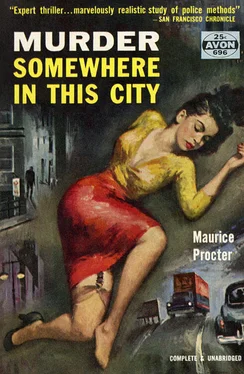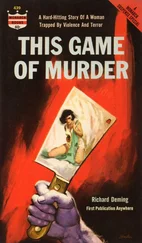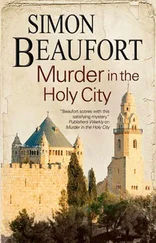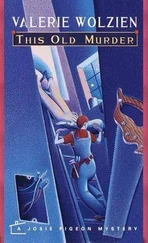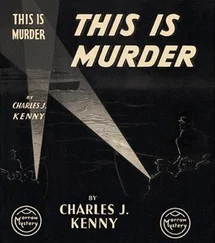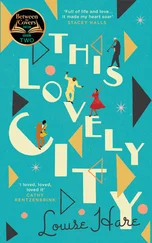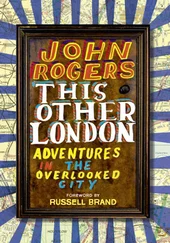Maurice Procter - Murder Somewhere in This City
Здесь есть возможность читать онлайн «Maurice Procter - Murder Somewhere in This City» весь текст электронной книги совершенно бесплатно (целиком полную версию без сокращений). В некоторых случаях можно слушать аудио, скачать через торрент в формате fb2 и присутствует краткое содержание. Год выпуска: 0101, Издательство: Avon, Жанр: Полицейский детектив, на английском языке. Описание произведения, (предисловие) а так же отзывы посетителей доступны на портале библиотеки ЛибКат.
- Название:Murder Somewhere in This City
- Автор:
- Издательство:Avon
- Жанр:
- Год:0101
- ISBN:нет данных
- Рейтинг книги:5 / 5. Голосов: 1
-
Избранное:Добавить в избранное
- Отзывы:
-
Ваша оценка:
- 100
- 1
- 2
- 3
- 4
- 5
Murder Somewhere in This City: краткое содержание, описание и аннотация
Предлагаем к чтению аннотацию, описание, краткое содержание или предисловие (зависит от того, что написал сам автор книги «Murder Somewhere in This City»). Если вы не нашли необходимую информацию о книге — напишите в комментариях, мы постараемся отыскать её.
Murder Somewhere in This City — читать онлайн бесплатно полную книгу (весь текст) целиком
Ниже представлен текст книги, разбитый по страницам. Система сохранения места последней прочитанной страницы, позволяет с удобством читать онлайн бесплатно книгу «Murder Somewhere in This City», без необходимости каждый раз заново искать на чём Вы остановились. Поставьте закладку, и сможете в любой момент перейти на страницу, на которой закончили чтение.
Интервал:
Закладка:
Outside the room, Clay said: “I’ve got to see the Chief now, so I’ll turn Savage over to you. All we’ve got on him are his green fingers, and he won’t admit a thing. Won’t say a word except ‘Why have I been arrested?’”
“Have you drawn his attention to his green fingers?”
“No,” said the superintendent. “I never mentioned his fingers. You please yourself. I’m off now. He’s all yours.”
Martineau returned to the room and sat in Clay’s chair. For some time he sat in silence, considering Savage, looking him up and down. The innkeeper was a big young man. He was quite handsome in a swarthy, bull-necked way. But in spite of his dark skin he always looked very clean and well turned out. This morning he was dressy-elegant with an ineradicable touch of vulgarity-in a well-pressed gabardine suit, a nylon shirt and a bright silk tie, for he had been picked up while doing some shopping in Castle Street.
“Have a cigarette, Doug,” said Martineau at last.
“Thanks,” said Doug, taking a Player’s from the proffered packet. “So you’re going to try the soft stuff.”
“Call it that if you like,” Martineau rejoined. “I’m going to give you the chance to show you’ve got some sense.” He was looking at the other man’s hand as he lit the cigarette for him. The green dye on his fingers was in faint small blotches and streaks. Considering that in all probability there would now be much less of the dry powder on the stolen money, it looked as if Doug had handled more than one or two of the stolen notes, though he may not have handled a great many. It looked as if he had been in contact with someone who had had quite a lot of the money. Within the last thirty-six hours he had met and probably spoken to one of the murderers of Cicely Wainwright.
“All right, get cracking,” Doug challenged. “I’ve been here too long already.”
Martineau mentally reviewed Doug’s record. It was a record of violence and dishonesty, but not a record in which those two criminal characteristics ever appeared together. Doug’s offenses were disorderly conduct, assault on police, obstruction of police and malicious wounding on the one side, and many cases of fraud on the other: fraud connected with black market, with racing and football, with the money and property of the various people who had been unwise enough to enter into trade with him. He was an incorrigible “twister,” as untrustworthy as a starving mongrel. It was fortunate for him that his mother’s inn was a free house, so that he could not defraud any brewer who had the power to throw him out. And his mother knew him too well to let him take more than small amounts from her.
But he was not a thief in the exact meaning of the word: he did not commit larceny. And he was never violent in cold blood, for the sake of gain. As a criminal, Doug had little in common with a man like Don Starling. The two disliked each other.
Martineau thought: Doug is innocent, and he feels very virtuous and indignant. It makes a nice change.
He said: “I saw you on Saturday, and you told me you’d seen nothing of the crime which happened right outside your pub. You said you knew nothing about it.”
Doug nodded. “That’s correct.”
“But now we have some evidence which implicates you.”
“So I’m told. You’d better show me this evidence.”
“We’re not going to show you. Not yet, anyway. But the evidence is there.”
“Nay, Inspector! I thought you’d have more sense. You expect me to believe a tale like that?”
“For your own good you’ll believe it.”
“The well-known phrase! When the hell did a copper ever worry about what was good for anybody but himself?”
Martineau grinned. “Not often,” he said. “And I’m not worrying now. You’re the one who needs to worry.”
“You once told me an innocent man never needs to worry.”
That made Martineau pause. “A shrewd thrust, Doug,” he said. He wondered how on earth he was going to get information from this man, this intelligent man, who had been taught from boyhood that he must never tell the police anything. There was only one way: convince him if possible of the honesty of police intentions, and then put the fear of God into him.
“An innocent man doesn’t need to worry,” he said, “if he’s prepared to maintain his innocence by giving a full account of his actions.”
“Ah, you mean you want me to open my mouth and put my foot in it. Having no evidence against me, you want me to give you some.”
“How can you, if you’re as innocent as you say?”
“I don’t know. I’m not taking any chances.”
“Listen, Doug,” said Martineau. “How long have you known me?”
“Too long.”
“Have I ever tried to fix you for something you didn’t do?”
“You’ve walloped me a time or two,” replied Doug reminiscently, and with a certain amount of respect.
“I’ve walloped you when you were being a rough boy. I’ve never laid hands on you to make you admit anything.”
“I dare say that’s true,” was the reluctant answer.
“I repeat, have I ever falsely accused you?”
“No, I can’t say as you have.”
“Have I at any time exaggerated the evidence against you?”
“No.”
“Well, I’m not exaggerating it now. We have evidence. You have an alibi, but there is such a thing as accessory after the fact.”
“If there’s evidence, you planted it.”
Martineau shook his head. “You know perfectly well I don’t go in for planting. Besides, this is something the police couldn’t have planted. But you’re on the right track. Intentionally or otherwise, someone has implicated you. They’ve dragged you in. But if you’re innocent you can soon get yourself out.”
“By talking?”
“By answering my questions.”
“Ask your questions, and we’ll see whether I’ll answer.”
“All right. We’ll summarize your first statement. All Saturday morning you were in the Prodigal Son, getting ready to open. Then you had a bath and a shave, and your dinner; then you helped in the bar until some friends called with a taxi, and you went to Doncaster with them. You have witnesses, and all that has been verified. By the way, what sort of a taxi was it?”
“A Silverline. Your man verified that, too.”
“Do you usually have a Silverline when you go to the races?”
“No. We usually have Laurie Lovett, but be let us down. He said he was booked up.”
Martineau nodded, and made a note of the name, though he attached no significance to it.
“When you got back from the St. Leger,” he continued, “you had your tea and then worked in the bar till closing time. Then you had your supper, read the Sports Final, and went to bed.”
“You never said a truer word.”
“Right. Now I’ll tell you something. While you were in the bar I dropped in to see you-”
“Just when I was busy.”
“-and while I was talking to you I noticed that the evidence which implicates you wasn’t there. Get that clear, Doug. It was between that interview, and this morning, that you were drawn into the job. So now we get down to cases.”
Doug began to show interest, and some uneasiness. “Do you mean to say there’s some evidence in the pub?” he demanded. “Did you plant it while you were there?”
“The pub is being searched at this moment,” said Martineau, “but the evidence I am referring to is not there. And, wherever it is, I couldn’t have planted it. I can prove it. I came into your place and touched nothing and nobody, and I didn’t have a drink.”
Doug was bewildered. “I wish you’d tell me what this damned evidence is,” he protested.
Martineau would have liked to say that it was the Mark of Cain, but he refrained. “I can’t tell you yet,” he said. “But the sooner I get my men, the sooner you’ll know what the evidence is and who shopped you, if you were shopped. Let’s move on to Sunday. Sunday morning?”
Читать дальшеИнтервал:
Закладка:
Похожие книги на «Murder Somewhere in This City»
Представляем Вашему вниманию похожие книги на «Murder Somewhere in This City» списком для выбора. Мы отобрали схожую по названию и смыслу литературу в надежде предоставить читателям больше вариантов отыскать новые, интересные, ещё непрочитанные произведения.
Обсуждение, отзывы о книге «Murder Somewhere in This City» и просто собственные мнения читателей. Оставьте ваши комментарии, напишите, что Вы думаете о произведении, его смысле или главных героях. Укажите что конкретно понравилось, а что нет, и почему Вы так считаете.
